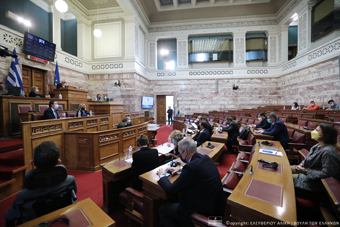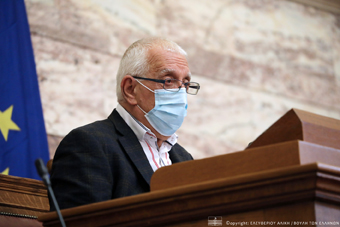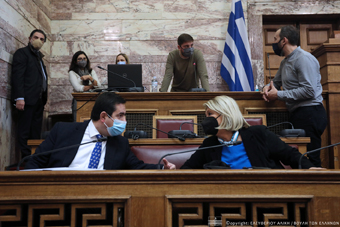Press Office
Athens, 13 December 2021
European Affairs Committee hosts event on theme "The European asylum and migration policy, challenges and prospects"

A special event of the European Affairs Committee on the theme “The European asylum and migration policy, challenges and prospects” took place today at the Hellenic Parliament, in the framework of the Conference on the Future of Europe. The event was the first in a series of debates that will be organised by the Hellenic Parliament, seeking to engage with civil society on issues of European interest. These events will be related to the topics of the working groups of the Conference on the Future of Europe, in which four representatives of the Hellenic Parliament participate, namely MPs Dimitris Kairidis, Marietta Giannakou, Ioannis Bournous and George Papandreou.
At today’s first event, linked to the Working Group on Migration, chaired at European level by Mr Kairidis, the keynote speakers were the Vice-President of the European Commission for our European Way of Life Margaritis Schinas, the Minister of Migration and Asylum Notis Mitarakis and the Deputy Minister of Migration and Asylum, competent for Integration, Sofia Voultepsi. The following also took the floor: Ioannis Bournous, Lesbos MP, as member of the Hellenic Parliament delegation to the Conference on the Future of Europe, Georgios Christianos, Coast Guard Captain and Head of the Integrated Maritime Surveillance Service, Georgios Apostolou, Head of the Greece and Cyprus FRONTEX Liaison Office, Vassilios Panourakis, Samos Deputy Regional Governor, Maria Clara Martin, UNHCR Representative in Greece and Irini Agapidaki, Special Secretary for the Protection of Unaccompanied Minors.
The event was opened by the 1st Vice-President of the Hellenic Parliament and Chairman of the European Affairs Committee Nikitas Kaklamanis, who stressed the importance of the Greek society’s contribution to the dialogue to formulate a European migration policy. It was in this direction that both today’s meeting and the joint meeting of the competent committees were organised, which resulted in the adoption of an opinion on the proposals of the new pact on migration and asylum by a large majority, and during which the Hellenic Parliament criticised the absence of provision for a mandatory relocation mechanism. Mr Kaklamanis noted that today conditions for an open dialogue with the partners are more favourable, following the events of last August, when Belarus used, at the Eastern borders of the EU, practices similar to the ones used by Turkey in February and March 2020, and it is therefore clear that in a political union solutions should be provided in a coordinated and collective fashion.
Mr Kairidis, conveying the atmosphere of the Conference’s work, noted that the working group on Migration is the most polarised among the nine. In this context, the effort of the Greek presidency is to achieve a balance between the two trends that emphasise border protection and migrant protection respectively. Commenting on the proposal for the new pact, he noted that it is a difficult negotiation, with a mediocre result compared to the initial expectations.
Mr Schinas emphasised in his speech that now is the right time for a new European migration policy, citing the European Council’s immediate response to the crisis at the Union’s Eastern borders with Belarus. He also highlighted the debate on the upcoming revision of the Schengen rules, stressing the importance of introducing the concept of instrumentalisation into community law through the relevant Communication by the European Commission. Summing up, Mr Schinas recalled the three pillars that the new pact should be based on: emphasis on the external dimension, strong external borders and an enhanced system of solidarity with burden sharing.
In his speech Mr Mitarakis noted the great progress that has been made in our country in terms of managing migration flows, underlining that Greece is now able to demonstrate substantial infrastructure and also exportable know-how. He emphasised the need for effective border control in full compliance with the international and European acquis, underlining that at the same time border control saves lives, citing data on missing and dead migrants in 2021, at a record low in comparison to the last five years. Regarding Greece’s aspirations in the context of the negotiations for the new pact, the Greek Minister spoke of a system that will be sustainable and crisis-resistant, that must be based on the principles of active solidarity and fair sharing of the effects of migratory pressure between member states, through the creation of a transparent and automated solidarity mechanism centred on relocations.
The Deputy Minister of Migration and Asylum Sofia Voultepsi underlined the need to intensify efforts in the process of integrating refugees and migrants eligible for international protection. In this context, the Deputy Minister presented the New National Strategy for Integration, which will be immediately put to public consultation and includes a pre-integration stage with education and training for all, ensuring the protection of human rights while creating jobs in crucial sectors of the Greek economy and GDP growth, to the benefit both of refugees and the Greek economy. The New National Strategy for Integration combines protection with education, training and vocational rehabilitation, focusing on the integration of refugees in Greek society.
In his intervention, Mr Bournous emphasised that the countries of destination are barricading themselves behind the Treaties, assigning the role of “warden” to the countries of transit and first entry. He also reminded participants that the countries of the South, which suffered decades of austerity policies, are not an attractive destination for those who seek security and employment, however, due to their geographic position, are being called upon to manage the problem.
High resolution images
Back